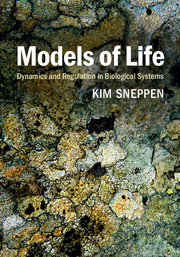Book contents
- Frontmatter
- Contents
- Preface
- 1 Life from a physics perspective
- 2 E. coli as a model system
- 3 Dynamics of regulatory links
- 4 Statistical mechanics of phage λ
- 5 Diffusion and randomness in transcription
- 6 Stochastic genes and persistent decisions
- 7 cis-Acting gene regulation and epigenetics
- 8 Feedback circuits
- 9 Networks
- 10 Signaling and metabolic networks
- 11 Agent-based models of signaling and selection
- 12 Competition and diversity
- 13 Evolution and extinction
- Appendix
- References
- Index
13 - Evolution and extinction
Published online by Cambridge University Press: 05 October 2014
- Frontmatter
- Contents
- Preface
- 1 Life from a physics perspective
- 2 E. coli as a model system
- 3 Dynamics of regulatory links
- 4 Statistical mechanics of phage λ
- 5 Diffusion and randomness in transcription
- 6 Stochastic genes and persistent decisions
- 7 cis-Acting gene regulation and epigenetics
- 8 Feedback circuits
- 9 Networks
- 10 Signaling and metabolic networks
- 11 Agent-based models of signaling and selection
- 12 Competition and diversity
- 13 Evolution and extinction
- Appendix
- References
- Index
Summary
History
Evolution [1, 4, 689, 723, 724, 725, 726] and the ability to evolve is basic to life. It is perhaps the most unique ability that separates life from non-life. The process of evolution has brought us from inorganic material in ~ 3.8 billion years, from our bacterial ancestors in ~ 2 billion years, from “primitive” sea-living chordates in ~ 500 million years and from common ancestors to mice in only ~ 100 million years. Evolution has inspired our way of looking at life processes throughout modern biology, including the idea that evolvability is an evolving property in itself [727].
Evolution is a costly process where most attempts are either without consequence or aborted by the error-correcting process of selection. That evolution has led to the present-day diversity of species, reflects the capacity of life to copy itself so abundantly that it can sustain the costly evolutionary attempts.
Evolution is the logical consequence of:
(1) Heredity (memory)
(2) Variability (mutations)
(3) Each generation providing more individuals than can survive (copying).
These points imply selection, based on the principle of “survival of the fittest” formulated by Darwin and Spencer.
A noticeable facet of evolution is that it works with a number of individuals N, that is much smaller than the combinatorial possibilities of evolving their genome.
Information
- Type
- Chapter
- Information
- Models of LifeDynamics and Regulation in Biological Systems, pp. 279 - 295Publisher: Cambridge University PressPrint publication year: 2014
